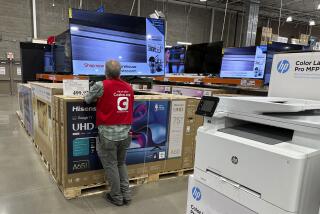MARKETS REACT TO KUWAIT CRISIS : Credit : Inflation Fears Pummel Bonds and Raise Rates
- Share via
Iraq’s invasion of Kuwait kindled fears of inflation in the United States on Thursday, forcing up interest rates and pounding the bond market.
The military action seemed likely to trigger higher consumer prices, not just for gasoline but for a range of products. Yet the magnitude of the increases might be modest, analysts said, perhaps adding less than one percentage point to the consumer price index.
“The events of the last 24 hours have thrown the financial markets into a state of increased confusion and disarray,” said Norman Robertson, chief economist at Mellon Bank in Pittsburgh. “No one knows what’s going to happen.”
Bond prices plunged in the crisis atmosphere, as investors worried about a new outbreak of inflation. The interest rate on a 30-year U.S. Treasury bond, for example, soared to 8.45% from 8.35% the day before. The bond lost 1 7/32 points, or $12.19 off a face amount of $1,000.
The gyrations reflected a dramatic change in investor psychology, sparked by the invasion. In recent weeks, financial markets were widely influenced by news of a weak U.S. economy and the expectation of lower interest rates. But on Thursday the specter of higher oil prices prompted a new look at priorities, including the likelihood of inflation.
“Today, the bond market shifted its focus from the soft economy to the high price of oil,” said Michael Penzer, a senior economist at Bank of America in San Francisco.
He maintained that an oil shock might nudge consumer prices upward for a couple months but would not create long-term problems. “I think once this crisis ends, the oil price could drop back down to where it was yesterday,” Penzer said.
For all the imponderables caused by the invasion--including uncertainty about the length and magnitude of an oil price hike--analysts agreed that it threatened to end the U.S. economic expansion, now in its seventh year and looking increasingly frail.
Donald H. Straszheim, chief economist at the Merrill Lynch investment firm, said the “two certain and direct effects” of the invasion are higher interest rates and slower growth, for the near future at least.
“What we don’t know is to what extent the spike in oil prices will be reversed in the coming days and weeks,” he said.
Prospects for a major, long-term rise in oil prices are somewhat offset by the fact that the United States has greater oil reserves than it did during the supply disruption of the 1970s. Also, there is no oil shortage, so the ability of Iraq alone to force prices up substantially--and keep them there--is in doubt.
Chief White House economist Michael Boskin told reporters that a hypothetical 10% jump in oil prices might ultimately mean a 1% rise in consumer prices. Earlier, Boskin had told members of Congress that higher oil prices would not stop U.S. economic growth.
Arough rule of thumb holds that a $1 per barrel increase in oil prices translates to a one-time 0.1% rise in the consumer price index, said Robert H. Chandross, chief economist for North America at Lloyds Bank in New York.
“Oil is the one commodity that causes inflation because it’s so pervasive,” said Robert T. Falconer, senior vice president and economist at Aubrey G. Lanston & Co., a securities firm in New York. “It percolates into so many activities and goods and services that are produced and consumed.”
A loaf of bread, for example, requires energy at the mill, the bakery and for the truck that transports it to the store as well as for the plastic that wraps it on the shelf, Falconer said.
In the first six months of this year, U.S. inflation was running at an annual rate of 5.9%, although it had eased to the 3.5% range this spring. Many economists had forecast inflation of between 4% and 5% for the rest of the year. Such forecasts are now being revised upward--typically a fraction of a percentage point--because of new uncertainties about energy prices.
Higher oil prices are a new problem for U.S. economic policy makers already faced with the difficulty of finding ways to reduce the federal budget deficit without harming an economy that is close to recession. “If I were (Federal Reserve Board Chairman) Alan Greenspan, the last thing I’d want to do is wake up and read there’s near-war in the Middle East,” said Robert F. Dieli, an economist with Northern Trust Co. in Chicago.
Until Thursday, the Fed was viewed as leaning toward lower interest rates to prevent the economy from sliding into a recession. In a climate of rising consumer prices, however, such easing becomes less likely because it could heat up the economy and fuel inflation.
Nonetheless, the Fed might gradually seek to lower interest rates as higher energy prices take a toll on economic growth. As a result, the invasion “may simply delay that easing--but not preclude it,” Chandross said.
CH... Bond Yields Move Higher...: 8.45% up 0.10% , PAUL GONZALES / Los Angeles Times
More to Read
Inside the business of entertainment
The Wide Shot brings you news, analysis and insights on everything from streaming wars to production — and what it all means for the future.
You may occasionally receive promotional content from the Los Angeles Times.










